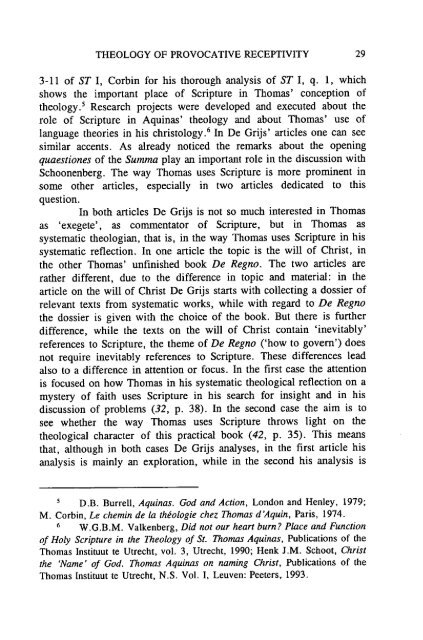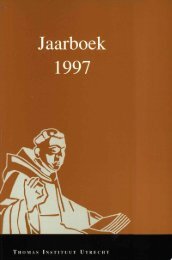Jaarboek Thomas Instituut 1995 - Thomas Instituut te Utrecht
Jaarboek Thomas Instituut 1995 - Thomas Instituut te Utrecht
Jaarboek Thomas Instituut 1995 - Thomas Instituut te Utrecht
You also want an ePaper? Increase the reach of your titles
YUMPU automatically turns print PDFs into web optimized ePapers that Google loves.
THEOLOGY OF PROVOCATIVE RECEPTIVITY 29<br />
3-11 of ST I, Corbin for his thorough analysis of ST I, q. 1, which<br />
shows the important place of Scripture in <strong>Thomas</strong>' conception of<br />
theology.' Research projects were developed and execu<strong>te</strong>d about the<br />
role of Scripture in Aquinas' theology and about <strong>Thomas</strong>' use of<br />
language theories in his christology. 6 In De Grijs' articles one can see<br />
similar accents. As already noticed the remarks about the opening<br />
quaestiones of the Summa play an important role in the discussion with<br />
Schoonenberg. The way <strong>Thomas</strong> uses Scripture is more prominent in<br />
some other articles, especially in two articles dedica<strong>te</strong>d to this<br />
question.<br />
In both articles De Grijs is not so much in<strong>te</strong>res<strong>te</strong>d in <strong>Thomas</strong><br />
as 'exege<strong>te</strong>', as commentator of Scripture, but in <strong>Thomas</strong> as<br />
sys<strong>te</strong>matic theologian, that is, in the way <strong>Thomas</strong> uses Scripture in his<br />
sys<strong>te</strong>matic reflection. In one article the topic is the will of Christ, in<br />
the other <strong>Thomas</strong>' unfinished book De Regno. The two articles are<br />
rather different, due to the difference in topic and ma<strong>te</strong>rial: in the<br />
article on the will of Christ De Grijs starts with collecting a dossier of<br />
relevant <strong>te</strong>xts from sys<strong>te</strong>matic works, while with regard to De Regno<br />
the dossier is given with the choice of the book. But there is further<br />
difference, while the <strong>te</strong>xts on the will of Christ contain 'inevitably'<br />
references to Scripture, the theme of De Regno ('how to govern') does<br />
not require inevitably references to Scripture. These differences lead<br />
also to a difference in at<strong>te</strong>ntion or focus. In the first case the at<strong>te</strong>ntion<br />
is focused on how <strong>Thomas</strong> in his sys<strong>te</strong>matic theological reflection on a<br />
mys<strong>te</strong>ry of faith uses Scripture in his search for insight and in his<br />
discussion of problems (32, p. 38). In the second case the aim is to<br />
see whether the way <strong>Thomas</strong> uses Scripture throws light on the<br />
theological charac<strong>te</strong>r of this practical book (42, p. 35). This means<br />
that, although in both cases De Grijs analyses, in the first article his<br />
analysis is mainly an exploration, while in the second his analysis is<br />
D.B. Burrell, Aquinas. God and Action, London and Henley, 1979;<br />
M. Corbin, Le chemin de LathéoLogiechez <strong>Thomas</strong> d'Aquin, Paris, 1974.<br />
6 W.G.B.M. Valkenberg, Did not our heart burn? Place and Function<br />
of HoLy Scripture in the TheoLogy of St. <strong>Thomas</strong> Aquinas, Publications of the<br />
<strong>Thomas</strong> <strong>Instituut</strong> <strong>te</strong> <strong>Utrecht</strong>, vol. 3, <strong>Utrecht</strong>, 1990; Henk J .M. Schoot, Christ<br />
the 'Name' of God. <strong>Thomas</strong> Aquinas on naming Christ, Publications of the<br />
<strong>Thomas</strong> <strong>Instituut</strong> <strong>te</strong> <strong>Utrecht</strong>, N.S. Vol. I, Leuven: Pee<strong>te</strong>rs, 1993.








